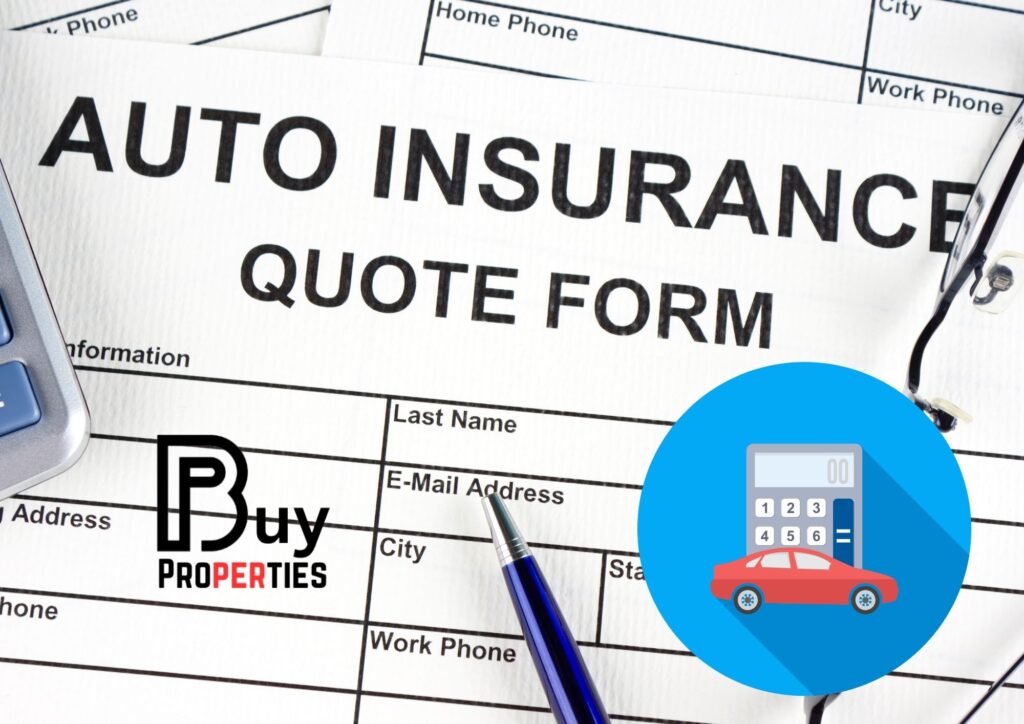An Auto Insurance Quote is an estimate of the amount you will pay for a car insurance premium. Additionally, it lists each coverage’s specific costs and limitations. A detailed quote may also include bill payment plans and any discounts for which you are eligible.

Getting quotes is a crucial step in the car insurance comparison process. Before purchasing a policy, always get quotes from multiple insurers to ensure you make an informed choice.
ESSENTIAL NOTES
- An auto insurance quote provides an estimate of your premium.
- Quotes are available from the company website, an agent, or a broker.
- In addition to requesting information about you and your vehicle, the insurance provider will review your driving history.
- Quotes consider a variety of risk factors, including your driving record, annual mileage driven, driving experience, coverages, and claims history.
- Obtaining quotes from several insurance providers enables you to evaluate the costs and scope of coverage offered by each provider.
Factors Influencing Automobile Insurance Quotes
A car insurance quote can give you a general idea of the premium that a provider charges, even though it might not provide you with an exact amount for coverage. Traditionally, underwriting—the procedure by which a provider evaluates an applicant’s risk and likelihood of filing claims—and rates have been used by insurance companies to set premiums. For example, an individual with a clean driving record and a history of moving violations and traffic accidents is considered a higher risk driver and will typically pay a higher premium.
Throughout the course of an insurance policy, premiums may vary in response to shifts in the risk profile. Typical grading criteria comprise an applicant’s:
- Age
- Mileage per year
- History of claims
- Covers
- Credit history
- Allowances for Deductions
- driving expertise
- driving history
- sex
- Whereabouts
- Status of marriage
- prior auto insurance
- Make and model of the vehicle
- Utilizing a vehicle (personal or commercial)
By lowering the risk you represent to the insurer, you may occasionally be able to lower your premium. For instance, you might get a cheaper premium by relocating to a safer neighborhood if you rent an apartment in an area with a high rate of auto theft. If you reside in a region that frequently experiences extreme weather events like hurricanes, tornadoes, floods, or hailstorms, your location may also be more dangerous.
Increasing your deductible—the amount you have to pay out of pocket for a claim—or removing unnecessary optional coverages are other ways to reduce your rate.
Usage-based insurance (UBI) programs, which base insurance rates on a driver’s driving habits, are becoming more and more popular among insurers. For instance, a UBI program may provide a lower premium than a traditionally rated insurance policy for drivers who uphold safe driving practices, refraining from late-night travel, hard stops, and speeding.
Where to Look for a Quote on Auto Insurance
When obtaining quotes for auto insurance, approach the process with a well-thought-out plan. Quotes are available in multiple formats:
- via an insurance agent, either in person or over the phone
- through national and regional carriers’ websites
- from independent brokers or agents of insurance, over the phone or online
Always abide by these guidelines when requesting quotes to ensure you receive the most accurate estimates and stay out of trouble:
- Always get quotes from multiple auto insurance providers to see which one best suits your requirements and price range.
- Make sure the insurance provider is authorized to sell motor insurance in your state at all times. You can check the license status of an insurer online using tools provided by numerous state insurance departments.
- Provide accurate answers to all inquiries regarding your driving record, type of vehicle, and frequency and purpose of use when requesting quotes.
- In order to obtain insurance quotes, you must provide personal data. Make sure you are speaking with a licensed insurance agent when you get a quote over the phone. Make sure the website has a secure, encrypted connection before requesting quotes online.
- Find out what discounts you might be eligible for.
- Compare rates, discounts, and coverages after obtaining your quotes.
Always get auto insurance quotes for the make and model you want to buy before making a new car purchase. Because of their higher theft rate, some cars are more expensive to insure than others. In 2021, for example, a large number of the most widely owned cars on the road were also the most sought-after targets for auto thieves.
Details Required to Request an Auto Insurance Quote
Each insurer has a different quote procedure, but many of them ask for personal data like yours.
- Name
- Talk to
- Details of how to get in touch
- Birthdate
- Accident and ticket history
- Number on the driver’s license
- sex
- Status of marriage
Anyone else who frequently drives your car will also require personal information from you, including their Social Security numbers. Even if someone else in your home doesn’t drive your car, the insurer may still ask for their names and birthdates.
Along with your personal data, you’ll need to submit comprehensive details about the vehicle you wish to have insured, such as its:
- Create and model
- year of manufacture
- physique
- History of coverage
- Details about financing or leasing
- Where to park (on a street, in a safe garage, etc.)
- Date of purchase
- Listed proprietor
- Weekly distance traveled
- Number for vehicle identification (VIN)
If you are looking for a new auto insurance provider but currently have auto insurance, you may be required to submit details about your current policy, such as its deductibles, limits, and coverages. The declarations page of your policy has information about your coverage.
Types of Coverage for Auto Insurance
The amount of coverage you require will depend on your individual needs and obligations as well as the legal requirements in your state.
Liability Insurance:
The majority of states mandate that you maintain minimum amounts of auto insurance coverage, which could consist of:
Liability for bodily injury: In the event that you are found to be at fault in an accident, this kind of insurance helps cover the other car’s occupants’ medical expenses. The bodily injury liability coverage does not, however, cover your passengers’ or your own medical costs.
Property damage liability insurance helps cover the cost of replacing or repairing someone else’s property, such as a building, car, or fence, in the event that you cause an accident that damages it. This kind of coverage does not cover replacement or repair costs for your car.
The policyholder and every listed driver are covered by both forms of liability coverage. In certain states, a policy may also pay for harm and property loss brought on by an unlisted driver using your car with your consent.
Certain states have minimum requirements for property damage and bodily injury coverage, which might not offer sufficient financial security. For example, the minimum bodily injury liability auto insurance required by California is $15,000, which is probably insufficient to cover the expenses of significant injuries.
Always make sure you have enough liability insurance to shield all of your assets from possible seizure for payment. Consult your insurance agent for guidance if you are unclear of the amount of coverage you require.
Protection from Personal Injury and Medical Payments
Certain states mandate that drivers obtain insurance policies that assist in covering their own and their passengers’ medical costs in the event of a covered collision.
Medical payments: You and your passengers’ medical expenses may be covered by this kind of coverage.
Personal injury protection (PIP), commonly known as no-fault insurance, assists in paying for your passengers’ and your own medical expenses. It may also cover funeral expenses or lost income.
Excess medical payments coverage assists in covering expenses over your PIP limit if you have PIP coverage.
Coverages for Underinsured and Uninsured Drivers
These kinds of coverage can assist in covering your costs in the event that you are in an accident with a driver whose auto insurance is insufficient or nonexistent. Many states mandate that drivers carry specific uninsured and underinsured motorist coverages, realizing the need to safeguard vehicle owners.
Uninsured motorist bodily injury: If you and your passengers are hurt in an accident involving an uninsured driver, this coverage may help with the cost of your medical bills. Additionally, it broadens coverage in the event that a hit-and-run driver strikes your car.
Uninsured motorist property damage: This coverage can assist with the cost of replacing or repairing your vehicle in the event of an uninsured motorist collision.
Underinsured motorist: This coverage can assist in covering your and your passengers’ medical expenses in the event that a driver with inadequate insurance causes an accident involving your vehicle.
States differ in terms of mandatory coverages and coverage caps. Your insurer may provide a particular kind of coverage even though it’s not required by law in your state.
Comprehensive and Collision Insurance
You are not required by state law to purchase coverage for your car. However, if you finance or lease your vehicle, the lender or leasing company will probably insist that you maintain collision and comprehensive insurance for the duration of the loan.
Collision: In the event that your vehicle is damaged beyond repair, collision coverage may assist with the cost of repairs. Collision coverage typically reimburses your car’s depreciated value, also known as actual cash value, in the event that the insurance company declares it a total loss.
Comprehensive: This kind of insurance helps cover losses brought on by non-collision-related hazards. For instance, comprehensive coverage might assist with the cost of replacing a stolen car or fixing one that was flooded.
The deductibles for comprehensive and collision coverages are usually different.
Extra Coverage Options
A lot of insurance companies provide add-on coverages that save you a lot of money in out-of-pocket costs.
Gap insurance can assist in covering the difference between the amount of the insurance settlement and the amount you still owe the lender in the event that you purchase a new car and it is totaled while you are still making loan payments.
Rental car reimbursement: In the event of a covered accident, this coverage may assist in defraying the expense of a temporary vehicle while your own is being repaired.
Roadside assistance: After a breakdown, you can get back on the road with the help of some carriers’ optional roadside assistance coverage. Extrication, fuel delivery, lockout, tire changes, and towing services are frequently included in basic coverage.
Why is a quote for auto insurance necessary?
Obtaining quotes for auto insurance is an essential step in purchasing a new policy. Insurance quotes can assist you in comparing the coverages, discounts, and optional coverages offered by different providers, even though locating the lowest premium is still crucial.
What is the typical cost of auto insurance?
Your location, age, and past claims history are examples of personal rating factors that affect how much your auto insurance will cost. Drivers under 65 with a spotless driving record pay an average of $1,588 a year for full-coverage auto insurance, according to a 2022 AAA report.
Rates can differ significantly between insurers, though. For example, a minimum coverage policy from some Denver auto insurance companies costs about $898, while a policy from another company costs as much as $8,223.
What distinguishes a quote from a rate?
Insurance rates are similar to the components that suppliers utilize to calculate a premium’s cost. On the one hand, you may be charged more for specific risks, and on the other hand, you may pay less for certain discounts. An insurance quote, on the other hand, is a preliminary estimate of your insurance costs based on a limited set of personal information. In order to determine a premium price and identify the risk that an applicant presents, insurers use the underwriting process.
Does obtaining a quote for auto insurance impact your credit score?
No. A “soft pull” credit inquiry is used by insurance companies; it will show up on your credit report but won’t have an impact on your credit score.
On the other hand, if you apply for credit frequently, hard inquiries from lenders may have an impact on your credit score.
Is it possible to obtain a quote for auto insurance without a car?
Indeed. In actuality, it makes financial sense to get quotes for a car before you buy it. One of the main costs of owning a car is insurance. Certain car makes and models have high rates of theft or safety problems, which can raise the cost of insurance.
The Final Word
When determining which insurance provider can provide the best and most economical protection for your vehicle, car insurance quotes are a crucial tool. Comprehensive quotes allow you to compare discounts, coverages, and optional protections in addition to price. When purchasing a new policy, always get quotes from multiple providers, regardless of whether you’re buying a new car or looking to buy a car you already own at a lower premium.

